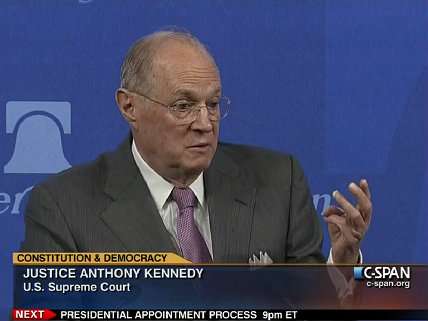Anthony Kennedy, Libertarian?
Understanding the retiring Supreme Court justice.

What's the best way to describe the legal/political views of retiring Supreme Court Justice Anthony Kennedy? For some pundits, the answer has been to label Kennedy a "libertarian."
As it happens, Kennedy himself weighed in on this very topic back in 2005. "People say I'm a libertarian," Kennedy told The New York Times that year. "I don't really know what that means."
Most libertarian legal experts would probably agree with him. That's because Kennedy joined the Supreme Court in handing the libertarian legal movement two of its biggest defeats in recent memory. In Gonzales v. Raich (2005), Kennedy joined the Court in recognizing a broad congressional power to control the interstate market in medical marijuana, even though the plants at issue were cultivated and consumed entirely within the state of California (and were cultivated and consumed legally under state law). Then, in Kelo v. City of New London (2005), Kennedy joined the Court in affirming that municipality's use of eminent domain on behalf of a private developer working in cahoots with the Pfizer corporation. Not exactly strong evidence of Kennedy's libertarian bona fides.
But things do look a little different when you zoom out and take in the bigger picture. At that point, Kennedy's overall impact on the Court does start to look a bit more libertarian. As I've previously argued, Kennedy stands out in recent years as the one member of the Court "who at least occasionally favors the basic libertarian mix of social and economic freedom."
Sometimes Kennedy even employs explicitly libertarian arguments. In his 2003 majority opinion in Lawrence v. Texas, for example, which struck down that state's sodomy ban, Kennedy repeatedly cited the powerful friend of the court brief filed by the libertarian Cato Institute, which explained why the Texas law was an unconstitutional exercise of state power.
Similarly, when the Supreme Court heard oral argument last March over the constitutionality of the Patient Protection and Affordable Care Act's individual mandate, it was Kennedy whose statements most closely tracked the libertarian legal movement's opposition to the law's unprecedented reach. "Here the government is saying that the Federal Government has a duty to tell the individual citizen that it must act," Kennedy told Solicitor General Donald Verrilli, "and that changes the relationship of the Federal Government to the individual in a very fundamental way."
Kennedy is the only member of the modern Court who has voted in favor of gays and guns while also opposing Obamacare. Libertarians can relate to that.
Over the years, I've seen Kennedy variously described as "libertarian-leaning," "libertarian-ish," "quasi-libertarian," and "modestly libertarian." None of these labels is entirely satisfying, but that's just because Kennedy's jurisprudence was never entirely satisfying. This mercurial justice defies easy categorization.
Related: Justice Anthony Kennedy Is Retiring and All Hell Is About to Break Loose


Show Comments (79)